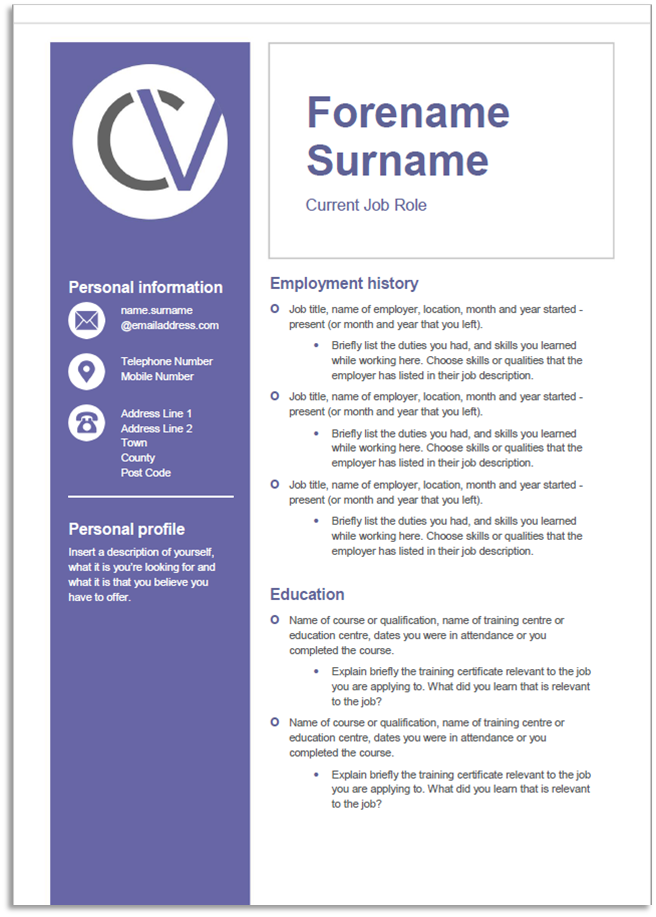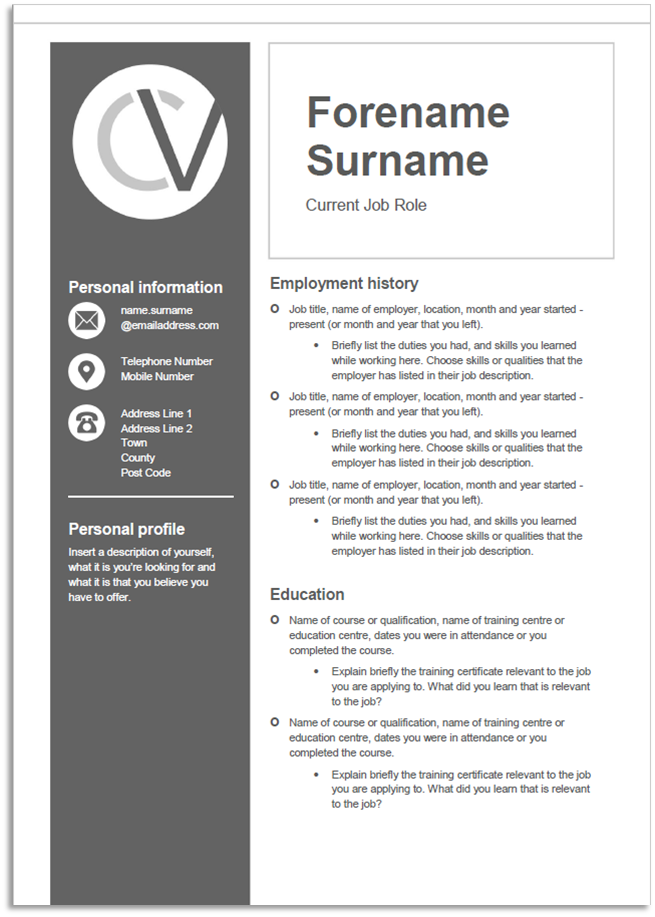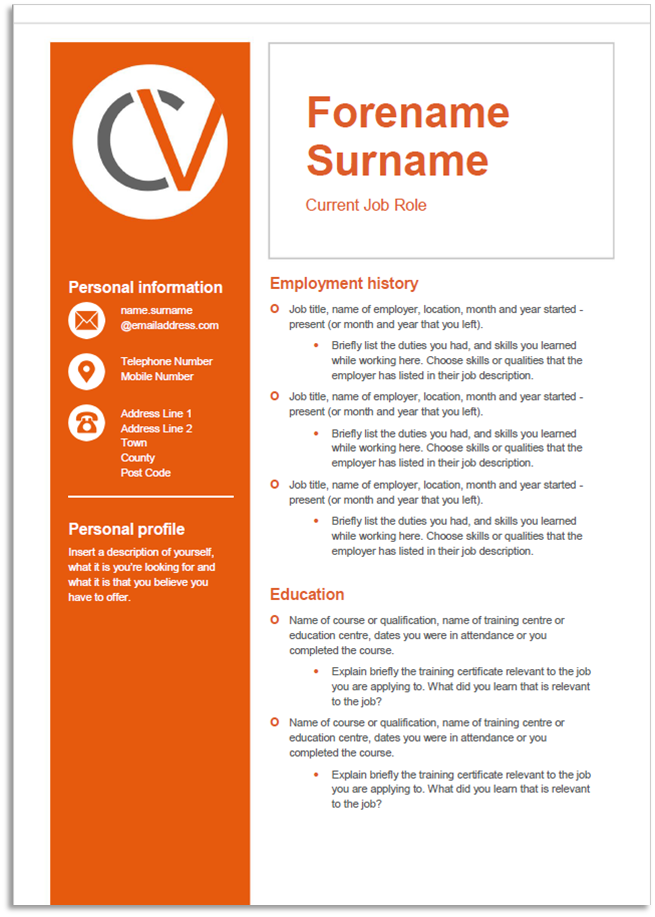To be successful as a Recruitment Consultant you need determination, a good memory and a quick mind.
Before applying for jobs, it’s important to make sure your CV shows all your skills and experience that are relevant to recruitment.
Our free CV template is tailored to help you write a CV that will ensure you stand out from the crowd.
A guide to writing a CV for a job as a Recruitment Consultant
Name: Alex Lambert
Tel No: 0000 0000 00
Email: AlexLambert@email.com
Address: 91 Winchester Road
Luton
LU81 4PL
Personal Profile
In the personal profile, you should professionally introduce yourself, in three or four sentences, with relation to the job you’re applying to.
Try to include: your current work situation, what type of work you are searching for (such as part-time, flexible hours, or full-time employment starting immediately) some key skills and/or traits that will show the potential employer that you are a good candidate for the advertised job. For example if you have previous experience of working in customer services or sales where you worked to targets, mention this here.
EXAMPLE:
I am a dedicated recruitment consultant with three years’ experience, and am looking for a challenging new role. I am target-driven, have a positive attitude, and great organisational and interpersonal skills.
Work History
You should use the work history section to show the skills and experience your current and previous jobs have given you; highlighting skills that are relevant to the job you're applying for. This will show potential employers why you are a good fit for the job. You don’t need to include every last detail, just pick the best parts. You can always write down and save your examples or other relevant skills for the interview.
Try to include your work history for the last five years. If you haven’t been working for that long, that is okay. It will be explained by the education history. If you have recently moved to the country, it’s okay to include employment in other countries. There is more advice on work and education history in our top CV writing tips.
- Job title, name of employer, location, month and year started – present (or month and year that you left)
- Briefly list the duties you had, and skills you learned while working here. Choose skills or qualities that the employer has listed in their job description
EXAMPLE:
- Junior recruitment consultant, Blue Arrow, Luton, October 2016 – present
- My key responsibilities included publishing job adverts, screening applicants to pass on to the employer, liasing with new clients and taking phone calls from job seekers
- I have also learned about maintaining client relationships and building good working relationships
What jobs should you include?
- Any jobs you’ve had in the administrative and secretarial, customer services or sales sector will be useful to include here, as lots of the skills will overlap and show you’re a good candidate for the role
- If you have recently left education, or are new to this type of work, try to include any jobs you’ve had that will highlight the skills the employer is looking for. For example, if you have worked on the reception desk in a school, use this to show that you have developed a good telephone manner, paperwork organisation and the ability to prioritise your workload.
Education History
In education history, this is a chance to show any relevant training you have done, what skills you have learned from your courses, as well as general education subjects you’ve done. As you get more work experience, this section will become shorter, as your work history becomes more relevant and more recent.
To be a Recruitment Consultant you need to be educated to at least GCSE-level and have good numeracy and literacy skills. Both on-the-job training and formal courses will likely be given to you on the job, especially when you first start in this role.
- Name of course or qualification, name of training centre or education centre, dates you were in attendance or you completed the course
- Explain briefly the training certificate relevant to the job you are applying to. What did you learn that is relevant to the job?
EXAMPLE:
- Microsoft Office Plus Diploma, Pittman Training, Bedford, November
- Covered the key areas of MS packages including word, outlook, excel, powerpoint and access, as well as two elective courses in excel expert and effective business communication
If you have completed courses or gained certificates in other work-related areas, or first aid, include that information here.
Skills
Here is your chance to highlight the best skills you have in relation to the job you’re applying for. Hint: these will be the skills listed in the job advert, but only highlight the skills you have. Misleading information on your CV is likely to trip you up in an interview and is unprofessional; you don’t have to show you have every last skill listed in the job advert to be successful.
EXAMPLE:
- Communication skills – ‘In my current role I have been actively improving my communication skills. This includes listening carefully to others, ensuring that information is passed on correctly and efficiently and being aware of other people’s situations and backgrounds. I feel more confident in contacting successful and unsuccessful candidates about roles they have applied for.’
- Multi-tasking and prioritising – ‘Particularly during the busiest times of year, I have learned how to manage my workload, work on multiple projects and prioritise what jobs need dealing with first.’
References
First and last name
Job title and relation to you in the work place (if it isn’t obvious from the job title), name of work place, work contact number (or main company phone number which they can be reached through) and work email address
EXAMPLE:
Jessica Scott
Manager at Blue Arrow, Luton
0000 0000 00
Jessica Scott@email.com
Who should you include as a reference?
- Your first reference should ideally be from a senior colleague or manager who you’ve been working closely with in your most recent role. The second reference can be from a current colleague, or line manager or supervisor from a previous job. It’s best practice to ask someone if they will be a reference for you before they are contacted. Be aware that not all employers actually contact references, but it’s important to have them available if needed
- It’s important to remember that while you are in your current job, consider that you may not want your reference (eg. your current boss) to be contacted until you have had an interview for a new possible job, or are actually offered it. This is because, for instance, if you weren’t offered the new job, and end up staying in your current job then you might not want your manager having been contacted as a reference. It can cause tension or awkward conversations about why you were trying to leave. A good way to get around this is to simply write ‘References available on request’. This shows the new employer that they can ask you for them as needed, but also means you can ask them to only contact them if you are offered the job, and then have time to ask the reference if it’s okay for them to be contacted. Most potential employers will be happy to wait to do this after offering you the job
- If you have only had one previous job, or have been studying, it is okay to include a tutor as a reference, or someone else as a character reference (who is not related to you)











